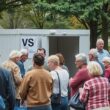A developing power struggle within the Christian Democratic Union (CDU) is threatening to destabilize the traditionally consensus-driven Konrad-Adenauer-Stiftung (KAS), a prominent think tank closely aligned with the party. Former CDU chairwoman and former Defense Minister Annegret Kramp-Karrenbauer is maintaining her candidacy for the foundation’s chairmanship, despite a direct intervention by current CDU leader Friedrich Merz who has publicly endorsed Union parliamentary group vice-chairman Günter Krings for the role.
Kramp-Karrenbauer’s continued pursuit of the position, as confirmed to the “Rheinische Post” marks a significant departure from precedent and sets the stage for a contested election – the first in the foundation’s history. The potential clash highlights deepening divisions within the CDU, particularly concerning the party’s ideological direction and future leadership.
Merz’s support for Krings, conveyed in a letter to the outgoing chairman, Norbert Lammert, underscores a clear maneuver to consolidate his influence within the party and shape the KAS’s future orientation. Krings, known for his more conservative stances, is viewed by some as a candidate who would align more closely with Merz’s vision for the CDU.
Observers note that Kramp-Karrenbauer’s decision to challenge Merz’s preference carries considerable political weight. Her leadership of the defense ministry was relatively short-lived and marked by internal disagreements. This candidacy then represents an opportunity to reassert her relevance within the CDU and potentially influence the KAS’s policy development, often perceived as a crucial platform for articulating the party’s core values and promoting its political agenda.
The forthcoming vote by the 52 members of the KAS on December 19th promises to be a highly charged event, potentially exposing fault lines within the CDU and revealing the extent to which different factions are vying for control of this pivotal institution. The outcome will be closely watched not just within Germany, but also among international observers interested in the evolving dynamics of European conservative politics.





